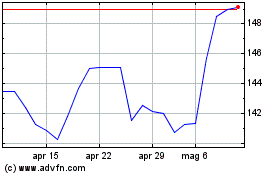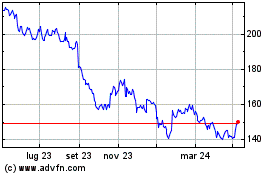Finance Chiefs Say Too Much Data Is Making It Harder to Keep on Top of Risks
19 Luglio 2018 - 12:33PM
Dow Jones News
By Nina Trentmann and Ezequiel Minaya
Corporate finance chiefs say forming a cohesive and complete
assessment of a company from proliferating data streams in an
increasingly digital workplace has emerged as a top challenge.
Faced with the mission to modernize systems and processes to
keep pace with competitors amid increasing global risk, only 39% of
more than 670 finance executives around the world said they are
highly confident about managing their company's risks, according to
a survey by Workday Inc., a digital technology provider, released
Thursday.
Data and the ability to make sense of it has become critical for
companies in recent years, as the digitization of the global
economy picks up pace. Risks such as international trade frictions
or volatile currency markets put the spotlight on CFOs and their
ability to swiftly assess available information and respond to
these threats, a task made easier with advanced analytics and
visibility across both operational and financial data.
Finance chiefs often lack the relevant skills within their
teams, and those in the C-suite fail to collaborate effectively,
according to the survey. Workday and Longitude Research Ltd.
surveyed executives in 17 countries including the U.S., Canada, the
U.K., Germany and China. Over a third were from companies with
annual revenues of more than $1 billion.
"Finance as a department is lagging behind in supporting the
transformation toward more digital companies," said Betsy Bland, a
vice president in Workday's financial management division.
"Businesses will be at risk of not surviving if they don't make
changes," she added.
Companies including recruiter Hays PLC, containership lessor
Seaspan Corp., drinks maker Pernod Ricard SA, pharmaceuticals firm
Roche Holding AG and insurer AXA SA are already streamlining data
to increase visibility into their operations.
Hays started its data transformation process in 2008 and invests
about GBP10 million ($13 million) a year on updating its systems,
the company said. Part of that goes toward integrating nonfinancial
information, which is automatically loaded into the finance system
in a process that doesn't require the information to be
reconciled.
"We all have one version of the truth... our systems talk to
each other" Chief Financial Officer Paul Venables said. "If your
systems don't talk to each other, you will end up doing a lot of
work in excel, outside of your systems," he said.
Seaspan is spending a "significant" amount on improving its data
to maintain its current share of 8% of the global containership
letting market, at a time of heightened technological change, said
finance chief Ryan Courson. Seaspan analyzes reams of data -- for
example on pricing, vessel speed and fuel consumption -- that all
converge in the finance function.
"CFOs sit on a tremendous data asset," said Eric Dowdell, global
head of trade credit at Dun & Bradstreet Corp. He advises
companies on how to manage their data to reduce credit, fraud and
other risks, a process that takes six to 12 months before yielding
the first results.
Bryan Corkal, finance chief of fertilizer maker Anuvia Plant
Nutrients, said he would "love to have real time production data,"
from manufacturing operations as the company is seeking to expand
aggressively. He is looking to fine-tune the usage of chemicals and
other raw materials, to assess the efficiency of labor and ferret
out any bottlenecks to production.
"I think it has to do with the life cycle of a company," he
said. "At what time does cost management become a strategic driver?
I know that the quality people feel the same way in the use of data
to improve quality."
Mr. Corkal, who joined the Zellwood, Fla., company in June,
plans to expand to Anuvia's data landscape. Anuvia spends roughly
1% of annual revenue on software and consultants. Four employees
currently dedicate about a fifth of their time to the data
initiative, though Mr. Corkal expects that to increase as he seeks
to gather real-time production data.
Hiring and training the right talent is key when making these
changes. Nearly 75% of survey respondents said that finance roles
will have to be redefined amid the rise of robotics and artificial
intelligence. CFOs need to hire data scientists, statisticians,
data security professionals and IT delivery specialists to master
the transition of their department, the Workday survey said.
Seaspan is bringing in people with a background in computer
science, said Mr. Courson.
Write to Nina Trentmann at Nina.Trentmann@wsj.com and Ezequiel
Minaya at ezequiel.minaya@wsj.com
(END) Dow Jones Newswires
July 19, 2018 06:18 ET (10:18 GMT)
Copyright (c) 2018 Dow Jones & Company, Inc.
Grafico Azioni Pernod Ricard (EU:RI)
Storico
Da Mar 2024 a Apr 2024

Grafico Azioni Pernod Ricard (EU:RI)
Storico
Da Apr 2023 a Apr 2024
